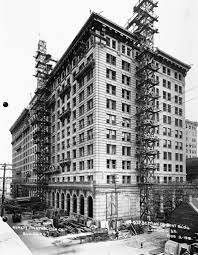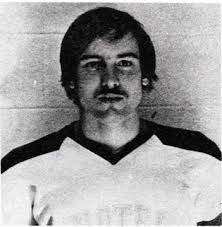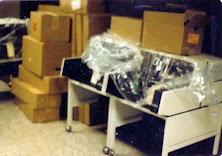CHAPTER 174 PRELUDES AFTER 1994
.
I had said I would tell what happened to me at Wilmington Trust. I guess it is time I make good and told what happened after 1994. I have to go back to the beginning, because it has the making of a movie or soap opera in how the characters came together in the same room in September 2001.
In 1979 there was a stodgy bank called Wilmington Trust Company. Ir’s headquarters was in the Dupont Montchanin Building on 10th Street in Wilmington, when I began there in 1980. . It had been founded in 1903 to handle the money of the duPont family. By the time I left on 2001 it had grown into one of the top twenty Trust companies in the United States, even though in 1980 I was conservative and just a quiet company prodding along.
In 1979 they hired for a new President named Barney Taylor from Fidelity in Philadelphia and a new dawn began and from that point on Wilmington Trust became a player in the financial whirlwinds of the eighties and nineties. Since I started a year later later than Barney, I used to kid it was really I who turned WTC around. Barney retired from being CEO in 1992, but stayed on the Board util 1998. He died on August 6, 2009 at the age of 79. He had recurring cancer and died from it’s complication.
Around that same time was a young and pretty and ambitious file clerk named Rita Turner, who took a flyer when the job of Assistant to the President was openly posted. Despite her relatively low station no no college degree, she applied and found favor with Barney and got the job.
After serving as Barney Taylor assistant for a few years, Rite was named as the head of the Marketing Division. Perhaps it was just jealousy, but many in Marketing, after finding out she was their new boss, wondered why. Before then she had simply been a file clerk with no previous training or experience in Marketing. Their were some who felt she had acquired her rise for the kind of special favors she may have accorded Taylor.
In 1980, the bank hired an accountant to head the accounting
division by the name of Ted Cecala. There was something unlikable about the guy. He had a mustache when he first came, which gave him a distinctly mafia don look. Ted Cecala reorganized the Accounting Division and some Financial Analyst jobs opened up.
This was where I enter the picture. I was currently unemployed in September 1980, I saw the classified in the Philadelphia Inquirer that Wilmington Trust had a Financial Analyst position in Accounting. I interviewed, but the manager, named Kammeran said he thought there was another job that I might find more suitable and he sent me to meet Walt Whittaker, Vice-president of Deposit Services. Walt hired me as Project Manager.
Best job I ever had in my life with the best boss, which was unfortunate I liked the job and I liked Walt so much I was satisfied to stay in that division and essentially that job for the next fifteen years.
As my duties increased so did my title up to Operations, Methods and Project Manager., until I was made an officer of the bank. This added Operations Officers to my already long title. Over my last decade, Operations Officer kept changing. I was Financial officer for awhile and I fished as Marketing Officer.
My duties also expanded and I had a great variety of things I did beside oversee projects. I introduced a Quality Circles type program called Action Concept Teams, I did the divisional newsletter, I introduced a training program called "Lunchtime Videos", I oversaw the move from the Center on Rodney Square to the new Operations Center in New Castle called the Plaza, I wrote and hosted and did media for the United Way presentations. I initiated and created a cost system. I introduced PCs as a tool. I pioneered Project Management in banking; even spoke on Project Management to the BAI in New Orleans.
mostly fresh college graduates looking for the fast track. They started with 10 such people, mostly white males. They were to go to each area of the bank for training over the course of one year. They were paid a no salary for that year with no guarantee of a job at the end. The training for our Division fell to me. I designed the training and supervised it. I even developed a final exam that they had to take as well as wrote a guidebook for their use. Also all the division managers had to rate each Intern after the program (this was required by human resources).
Within that group was a young man named Fil Sherry. He received the worst rating from the managers. I always thought he was disruptive and inattentive. He would come late to meetings and then have the gull to hold everyone up while he made phone calls. He also scored the lowest on the final exam.
In 1985, at the end of the training, two Interns were hired, one of whom was Fil Sherry.
About the same time that the first group of Interns was winding down, changes were made to Marketing. Barney didn't really like Marketing, so he reorganized it. At that time Marketing was part of the Administration Department. It had a division manager, named Jack Garrett, who was forced to resign. Barney named a new Marketing Division Manager -- one Rita Turner. Soon most of the Marketing Staff left the bank.
Since Barney, who was now not only President but also Chairman of the Board needed a new Assistant, he turned to the newly hired Interns that were offered jobs and picked Fil Sherry.
sponsored by the Vice-president of Retail, Robert Harra (left with his wife, Linda). This committee was necessitated by the reorganization of marketing and the number of marketing people who resigned when Rita Turner was named Division Manager. It was to oversee advertising and to try to design new products and services to be offered, and to give guidance to Marketing during the chaos of change. (I always had the fear I would slip and call Rita Turner by the name Tina Turner. They were nothing alike.
Wilmington Trust took off under the guidance of Barney Taylor. The business expanded and the stock climbed, yet down in the dark, cool windowless recesses of information technology in stubbornly clunked along on by-gone systems and over-the-hill IBM 1419 sorters (left). But they were proud of this, arrogant in fact. They bragged about how we managed this billion-dollar baby on 2-bit equipment.
Division. I had automated the lockbox operation and worked the numbers and sold the senior manager on the value of these remittance machines and
I converted check statement storage from account basis to bulk filing over a weekend even though everyone said it couldn’t be done. I got rid of keypunch and moved up to key-to-disk and then direct to mainframe. I was pushing for PC usage, for image storage, for check safekeeping, for many other projects. Our division had the reputation of the innovator and the rule breaker.
If we could just keep Senior Management fingers out of the pie. After covering Lockbox from a manual operation to an automated system, I was require to present reports to Senior Management or the effectiveness of this. The ROI was out of this world. I did line charts to demonstrate this. It was pointed out later that my chart looked like an aroused male organ, and that got a chuckle, but the result caused the same effect on the Senior Managers and right away they wanted more. Around late 1980s, the government loosened regulations on where a back could do its remittance services. Banks wanted to process in states with no real usuary laws so they could charge higher interest rates. Delaware fit the bill, and our Senior Management looks at what automated lockbox was generating locally and decided to offer processing to out of state banks thinking we could make a killing.Our volume of items increased greatly.but the ROI decreased. Our old local customers were actually subsidizing the out of state banks. Soon we lost some of our long time local customers, such as Delmarva Power because they decided we were overcharging them. I was asked to fudge my reports tp ,she to sales person look better, but I wouldn't do it, which didn't win me any friends.
This proved the same with he check safekeeping vendor I contracted with. Our Senior Manager looked at what was being down and wanted to install this system directly into our branches. Problem was the vendor didn’t know how to network their system. Our Savior Manager felt our own I/T department could do this and basically took over the project. This failed and a perfectly goo program for as a stand-alone system overwhelmed our software people and ended up being scrapped.
While the eighties were drawing to a close and Barney was getting rich, suddenly it was remured that he was going to retire. And indeed he did in 1992, although he remained on the Board until 1998. He passed the reigns over to Leonard Quill.
Major in the British SitCom, “Keeping Up Appearances. (Quill on left; The Major on right.) The both looked a lot like Quagmire on “Family Guy. for the matter.
Quill was an old time Wilmington Truster, a long-time commercial banker and senior manager of the Commercial Department before being named CEO in 1992. Leonard took over and the bank moved into a period of steady-as-it-goes. Leonard died on January 13, 2002, age 71, from pneumonia.
He also has a famous son, Tim Quill, who was an actor and has stared in some Hollywood features, such as “Hamburger Hill” and “Argo”. Tim died from cancer in 2017 at the age of 54. .
Of course, one thing that went when Quill became top dog was that Assistant-to-the-Chairman position (it had been Assistant-to-the-President originally). Perhaps Quill just didn’t feel he needed an assistant, I don’t know, but Fil Sherry just slid over to an office in Private Banking. Rita was relatively quiet during the Quill years.



















No comments:
Post a Comment